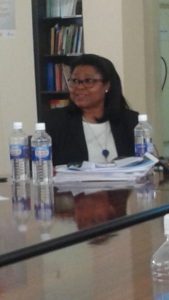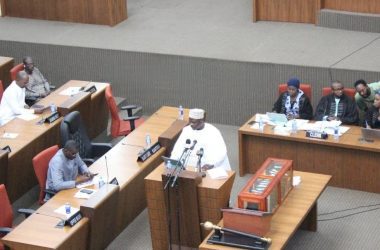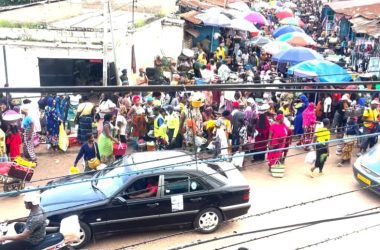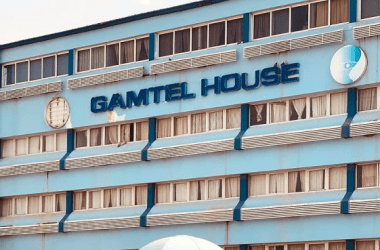
(JollofNews) – International Monetary Fund (IMF) Gambia office Tuesday lauched the October 2017 report on the Regional Economic Outlook for Sub-Saharan Africa (SSA).
The report is an IMF flagship that provide analysis of cross-country and spillover effects within SSA. It discusses the recent economic developments and the outlook for countries in Sub-Saharan Africa and key challenges confronting regional policy makers. It also provide country-specific data and economic forecasts and analytical chapters on issues of interest to the region.
The IMF resident representative Ruby E.M Randal said Sub-Saharan Africa’s growth has picked-up but is set to remain subdued with a recovery of about 6 to 7%.
She said Gambia’s treasury bills are coming down following the not too careful expenditure on fuel supply to the country’s power house NAWEC which has been eating too much into the economy. “With the liberalization of NAWEC, now there is expected improvement.”
The Fund’s April 2017 Sub-Saharan Africa regional economic outlook report classified Gambia as the highest debtor among the region’s IMF Member countries with a 120 percent debt compared to Guinea Bissau which holds only 46%.
Gambia is followed on the debt ratio by its closest neighbouring country Senegal with 57%, Guinea 56%, and the West African regional bloc, Ecowas with 29%.
Ms. Randall said for a quicker pick-up, there is need for economic diversification.
The country’s current erratic power and water supply failure is seriously slowing down business, bringing up negative impact on the economy. It is not sure whether the problem is a deliberate act by the government to reduce expenditure but it is anchoring a lot of lose in revenue to the government.
Gambia context
With a slow pick-up in economy, Gambian banks, for instance are only involved in commercial banking with less or no investment plan. Gambians are today feeling the pain from the pinch of the flan buoyant expenditure attitude of the country’s former regime.
Ms. Randall said in the context of bilateral country surveillance, funders want to enhance transparency and the nature of discussion with authorities will be on policy recommendations and responses on government position.
Permanent secretary at the Ministry of fiance and economic affairs Lamin Camara said the biggest problem of Gambia’s economy is that it has been building public debt on high interest rate.
“We are now reducing our appetite of borrowing. Government is now trying to correct itself by trying to bring down the 120% debt rate to at least 80 or 70%.”





Gambia must have a comprehensive recovery plan to include
1. Do not spend money you don’t have
2. Do not borrow what you can’t pay back
3. Spend wisely
4. Reduce waste
5. Be effecient
God Bless The Gambia
I second that motion.
✔
@ Dr Isatou Sarr
✔
Financial discipline very important. Manage the waste into profits, turn the profits into surplus, this requires hardworking and discipline.
Hard work required from all and sundry. Gov’t must establish fiscal discipline. Extra-budgetary expenditures must be relegated as a relic of jammeh’s infamous manners! Gov’t and privat agencies introduce the concept of LEAN in management, procurement , production and service sector processes. Fundamentally though, prerequisite for any meaningful development is the collective willingness to work hard. In any activity we found ourselves doing, hard work and good conscience for national interest should be our guiding principles.
Does anybody think the IMF have ever done anything for Gambia in the last 52 years other than put them deeper into debt, with the only encouragement and advice>>>to keep up your interest payments on time ? How else can they afford private yachts in Cannes harbour and buy Islands in the caribbean ?
I think it will be unfair, or probably even wrong, to say that the IMF did not do anything for The Gambia for 52 years, except put it into deeper indebtedness, but it and its sister organisation, the World Bank, have played no small roles in the dire situations that much of the Third World countries are in today. Many people may perceive such a statement as that age old game of “blaming the West” for all our problems, but not only are such perceptions mistaken, they also make it difficult for us to have honest conversations about our situations, with a view to reversing this chronic problem that has hindered Africa for so long.
The World Bank and IMF were created after WWII to provide funding for the reconstruction of Europe, but since the US was the dominant power at the time, both were created along US lines, and later became the institutions by which Third World Countries were integrated into the US dominated Global Capitalist System in the subordinate position of raw material producers and unrestricted open markets for manufactured goods (and services). That relationship has not changed to date. It has only become a bit sophisticated in nature and complexity.
Under the presidency of Robert McNamara (1968), the World Bank designed a programme of fully integrating Third World Countries into the US system and countries that “signed up” enjoyed access to seemingly endless loan facilities and other incentives, and thus began the build up of our indebtedness. The IMF became the “gendarmerie” of Western commercial banks, ensuring that they would not only get paid, but also consolidate their power over the “poor” indebted countries.
Having succeeded in “addicting” Third World Countries to loans and other freebies (development aid, grants, etc.), it was made clear to them that they would not access further loans from other sources without IMF seal of approval, and this would only be granted if IMF recommended conditions are fulfilled; conditions which destroy a country’s ability to produce, and become completely reliant on imports, thus creating the situation for perpetual dependence on economic “life support”, as exports always fall short of imports and balance of payments support inevitably needed from the West.
The debt crisis of the 1980s heralded the Structural Adjustment Programmes (SAPS) and thus, the subordination of Third World countries, especially African countries. This was the opportunity that the IMF seized upon to cripple Third World countries into perpetual poverty, by not only destroying our abilities to generate resources within, but also restricting government spending in favour of debt repayment. Countries that used to run viable and profitable public enterprises were told to liberalise, subsidise that ensured good crop yields in agriculture, for example, were abolished, public sector retrenchments were undertaken, cuts to, and user charges for, (once free) public services were introduced and the savings made were used to service debts.
We have got to situations where we literally “rob Peter” to “pay Paul”: we take loans to service our debts, and this rakes in a fortune for the IMF on a steady annual basis. As a financial institution that looks after the interest of its share holders, the IMF is doing a wonderful job, but by so doing, it is also partly responsible for the perilous situation that Third World countries, like The Gambia, find themselves in. The other “guilty” party is that group of clueless, “Yes sir” neoliberal puppets constituting the African leadership and bureaucracy, who are willingly complicit in the impoverishment of our continent.
The World Bank and IMF are not the problem, per se, as they are just instruments. The problem is the US Imperial design to impose itself on Africa, in particular and the Third World in general, and this hegemonic desire has never been more threatening to our survival in Africa, than now, as the US moves towards stationing combat ready troops on the continent, in the guise of fighting terrorism but most probably, to combat growing Chinese influence, whom it sees as a Global competitor.
In that regard, I think the Judas of the continent has to be Ismael Omar Guelleh of Djibouti, who is flirting with annihilation by being the first country in modern history, at least for Africa, to host military bases for four major powers in his tiny, little country, namely US, China, France and Japan. We should be very concerned that both China and US have got military bases and troops stationed in Djibouti, as these two heavy weights and competing powers could clash militarily. (God forgive)
Until we stand up and take control of our own destinies, we will never lift our countries from this endless poverty, but until we elect the right leaders into power, we will continue to play the role that was carved out for us: producers of cheap raw materials and markets for manufactured goods and structural adjustment programmes will be packaged and repackaged, but they will achieve the same results, more or less.
Very loaded report. First to Babu Soli. Here’s what I wish to draw your attention to, from the IMF Report:
Quote: “Gambians are today feeling the pain from the pinch of the flan buoyant expenditure attitude of the country’s former regime.”
Observation: Can you see why those of us who differ with you can say that the “development” you constantly keep talking about, is not commensurate with the level of Debt incurred?
Development is good, but “development” that has led our country to the unenviable position of most indebted country in the ECOWAS Region has to be questioned, especially when there is no significant difference in the lives of our people to the rest of the region.
This is why I’ve always asked whether it’s value for money, and obviously it’s not. Jammeh has used “development” to siphon money off the state coffers and the commission, which you have dismissed, is revealing the truth.
I hope you won’t back with your “development” claims ever again.
Quote: “It is not sure whether the problem (erratic electricity & water shortage) is a deliberate act by the government to reduce expenditure but it is anchoring a lot of lose in revenue to the government.”
Observation: Well, this is very serious, isn’t it? A report of such a nature, from such a reputable and well placed institution in The Gambia, has to be taken seriously, and if the people are subjected to such an ordeal to cut expenditure, whilst the “first” and “second” ladies are seen “donating” hundreds of thousands to various groups, institutions and communities, it would constitute the most unforgivable acts of cruelty.
I hope the media does its job and follow this up. The nation must know why there is this prolonged shortage in water and electricity. Maintenance alone cannot be a sufficient explanation, because that usually lasts for a few weeks.
Quote: “She said Gambia’s treasury bills are coming down following the not too careful expenditure on fuel supply to the country’s power house NAWEC which has been eating too much into the economy. “With the liberalization of NAWEC, now there is expected improvement.” ”
Observation: The natural questions are:
Has NAWEC been liberalized?
When was it liberalized?
Who are the new owners?
Have we got any shares?
How many shares do we own?
What about the liabilities of NAWEC; who now owns those?
The prolonged shortages now seems to make sense, doesn’t it? The new owners would have their business priorities, and that may not coincide with those of the common folks, unless there is mutual benefit.
I think the IMF rep got her words wrong; It should be “liberated”
Quote: “With a slow pick-up in economy, Gambian banks, for instance are only involved in commercial banking with less or no investment plan.”
Observation: I hope political parties which want to rely on commercial banks to revive agriculture and improve production are taking note. Commercial Banks in The Gambia are not interested in the agricultural sector, and thus, they (the parties) must come up with ingenious policies to entice commercial banks into agriculture.
Let’s begin to ask our politicians how they want to manage our resources and achieve their manifesto pledges.
I Welcome the publication of the report. First step towards transparency and a tangible instrument to scrutinise gov’t and private sector actions. In the haydays of jammeh, such a report would not even be conceived not to talk of seeing the light of the day.
We the citizens, like Bax is doing, are now compelled to ask questions and provide constructive feedbacks on many areas where we have expertise.
Kemo; this is a report by the IMF>>>not the coalition. I doubt the coalition would want its current and past record published. I mean to say if the coalition were to ask for all its debts to the IMF to be written off, this would set a precedent for all other member countries in Africa. In this, The coalition are not on this planet. I think as Bax suggests…this report can only signify a significant distance between both the IMF and the GG. However, One could argue a case for debt relief on the basis that the IMF are an equal partner in the amount of debt accrued under the IMF’s guidance. I think it’s a bit too convenient for the IMF to claim Gambia’s debt problems were amassed because of embezzlement, without giving specific levels, amounts from where and by whom.
Banks are not in business to make money for the borrower; Banks are in business to make profits for themselves and their shareholders. In this case the” major” shareholders are America, Germany, France, Britain and Japan.
Try reading a bit of Hon Halifa’s neo socialist thoughts. I find them super directional and make a lot of sense. No need to follow the west or the east. Gambia does have it’s own sound philosophy. It just never gets elected. ,,,and thereby lies the problem.
But who am I to say ? Bourne thinks I am a capitalist just because I donated half a million to Gambian good causes. I am informed my room at the Atlantic is almost ready,, more good causes beckon.
Mr Rubik’s cube Bourne>>>> Try working this one out ?
I was a capitalist when I was making my money and a socialist when i was spending it;
Politically I am a Liberal. Has the penny dropped for you yet ?
Or will you keep putting false labels on my forehead ?
Bourne; My long time friend…am sorry you were ripped off. I have been ripped off too many times, but I always took my revenge. “as Mr Halake used to say. Revenge is a dish best served cold. Never give up…God emboldens the righteous.
Stay cool. my good friend.
What a man wants to be in life he generally becomes. Never give in to your losses or defeats. You have to endure all manner of defeats and defections to become a winner.
Looking back I spent a lifetime climbing up and down to wealth, Then wasted my final years trying to keep it. The benefits of wealth are illusions once attained count for nothing. When you’re strapped up to a Ventilator gasping for your last breath. A million pounds is the most useless asset of all. Giving up smoking buys you ten years. A Million Pounds at the nearly end of your life buys you absolutely nothing, but attracts the last people you want to see, at your bedside.
Kipling said….” if you can count winning and losing as the same imposters”
I sometimes wonder if he was a very bad poker player disguising his defeats as mere illusions. to the extreme of self deception ?